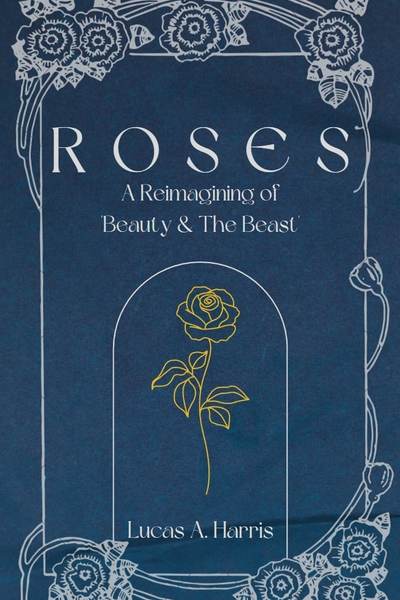For the seventeenth month in a row, almost like the city had been holding its breath in anticipation, the sun rose on a calm Antham; there were no midnight fires, no surge of refugees leaving for the safety of the Sandwall Plains, no riots, and, as far as the citizens knew, clean running water.
This didn't mean the city wasn't in shambles anymore. The Great War left newspapers struggling to fill their pages with stories after thirty years of battle. The city's government and civic buildings, including its Opera House, had been left ruined by night bombings and raids. Antham's west quarter had burned in the early years of the war, and was never rebuilt.
Returning soldiers looked for work in a city that was nearly bankrupt.
~ ~ ~
Lillian Prescott opened her green eyes to the sun shining into her medium sized, third floor bedroom. Her bedroom was decorated in a light green color, like the color of spring, and outlined in crisp white crown moldings; wall ornamentations, as well as most furniture, were missing. Hanging from the ceiling was a small chandelier that produced a substantial amount of light when the moon appeared. Through its hanging crystals, rainbows cast itself upon the opposite wall.
Lilly opened the doors to the rough-iron railing that overlooked the garden and, pausing to listen to the commotion in the street, gazed down at the green space behind her home. A gentle wind slid past her from the seaport, the ocean-going vessels sitting in the harbor bobbing like bath toys. Higher above, the rhythmic humming of departing airships floated gracefully through the air added to the ambiance.
She was so sure she had never smelled anything so wonderful before.
The Central Clocktower rung out – five in the morning.
Lilly jumped at the first chime. The clock had been out of service for almost twelve years, and, with many of the tall buildings gone, the sound resonated.
But she smiled despite the increased, rapid beat of her heart. Change was upon them.
The bedroom door creaked opened; in entered Edith, one of the few housemaids that remained with the family. “Good morning, ma’am,” she began, going to the bedside to retrieve the bedpan.
“I can do that.”
“No need, Miss Lillian,” Edith replied. “It’s my job.”
Lilly blinked twice, turned back to the wardrobe, and said, “I keep forgetting that that the war is over. Is that strange of me?”
“Not at all, ma’am,” Edith said. The maid turned to the balcony to dump the contents of the bedpan into the nearby alley. “Sometimes I wake up wondering if the seize fire was just a dream.” She paused, as if wondering to continue. “I...certainly know Miss Elizabeth thinks it.”
Lilly turned back to Edith. “E’s up?” she asked curiously, pulling a blue dress from the wardrobe. “When did she rise?” She slipped it over her head.
Edith slipped the bedpan back under the bed. “I don’t know. I went in earlier to check on her, and she was already awake.” She moved and buttoned up the back of the blue dress. Smoothing out the wrinkles, Edith returned to the bed to make it. “I am concerned for her, miss. I don’t believe she’s had a good night’s sleep in a long while.”
“I bet she’s still shocked about the war,” Lilly replied.
Edith blinked. “And how would you know, miss? If I may ask?”
Lilly begrudgingly threw a shawl over her shoulders, a lacy white thing that complimented her dress. She groaned at her appearance. “I’ve haven't read enough consciousness books to assume anything, but there is strong evidence that supports it.”
The maid nodded, and proceeded towards the door. “Your father is waiting for you downstairs.” Lilly nodded her thanks, but turned back to the still open windows.
"Not yet," Lilly mused, reaching over to the bedside table and retrieving a thick leather bound book. “A folk story about settlers in a new world,” she said, flipping to the first few pages for the whole subtitle. “‘Loosely based on the events of early Greenspring.’ How odd is that?” Clearing her throat, Lilly began reading –
Before the formation of the Arcadian Empire, before the outbreak of the War, sat the empty Flatlands south of the Mulrean Passage. Aboriginals had claimed the lands for themselves, but by 1304 C.E.A., the city of Fayhaven had grown too great.
In entered Wilbur Kennett, a man described by many as, "starry eyes", and was probably seen by his superiors as such. Nevertheless, Fayhaven needed space, and the Flatlands were the destination...
~ ~ ~
A rather handsome and well-dressed man bowed deeply and departed from the forward sitting room. Lilly sat back and sighed, exhausted. Her mother, seated on one of the two leather couches, reclined as well. She noted something down in a notebook nearby.
“Well,” Mrs. Prescott began, after many silent moments, “he was... intriguing.”
Lilly eyed her mother, eyebrows raised into a surprised expression. “Mother, he was duller than sand.”
“His prospects are respectable. He’s a businessman. With a good background.”
“That may be, but I'd rather eat sand talk to him again,” Lilly retorted.
“Mind your tongue, young lady.”
An intentional groan escaped from Lilly’s lips. “Mother, please. You know it. I know it. He’s just...he's just walking sand. He may have good prospects, but I need someone who interests me, intrigues me.”
“Sweetie, those sorts of people just exists in those novels you read,” she replied, still writing in the notebook.
Lilly sighed and reclined again. After another moment of silence, she asked, “Where’s Father? He wasn’t here when I came downstairs.”
“He went to work. I believe he said that he would be back late tonight,” Mrs. Prescott muttered, her pen moving fervently.
“Can we take a break? I would love to go for a stroll.”
Her mother exhaled, and put the notebook to the side. “It isn’t even high noon yet, Lilly.”
“Please?” her daughter asked. “You know how I don’t like this room. It get too stuffy after a while.”
Mrs. Prescott could agree to the claim. A great deal of money had been spent in decorating the first-floor public rooms, meaning that they were lavishly appointed with large colored rugs, tapestries, portraits, paintings, vases, flowers, and the finest furniture money could buy. The room also overlooked the street, consequentially filling the sitting room with the smell of the sea and horse excrement if the windows were opened.
The two agreed that, after eating the noonday meal, they would go for a stroll down to the Piers.
They dressed appropriately; off came the blue dress Lilly had worn for most of the day, in its place was a light green dress that was covered by a long brown coat. Her shoes and stockings were white and her hair had been put up into a bun, hidden by a large floppy hat with a faux red rose wrapped in ribbons around the top.
As soon as she and her mother had stepped outside the townhouse, the two turned down the nearby alley and ran towards the sea. Giggling and laughing, Lilly and Mrs. Prescott rushed through the streets, being quick as to not be recognized for such childish behavior. They did this often; Lilly’s mother knew of her daughter’s love of the sea, and her daughter knew of her mother’s love of the ocean air and watching the airships float by.
They could easily have spent an entire day at the seaside.
When they approached the sea, their run had turned into a race, with Mrs. Prescott in the lead. She stopped just short of the railing overlooking the Pier, and caught her daughter before she had run herself over the side. Both erupted into a contagious laughter and giggled for some time before calming down.
The Pier was where most of the ocean-going vessels docked, a structure made of wood that stuck out from the Boardwalk over three hundred feet. Everything from cargo vessels to luxury yachts docked in this port, but what Lilly found more interesting was their design; they had the sleek design of one of her father’s merchant airships yet the bulkiness of a house.
“How do they work?” Lilly asked no one in particular.
“What?”
Lilly looked to her mother and replied, “I was just wondering how they floated. They just seem...heavy.” Mrs. Prescott’s gaze returned to the ships, watching as they tugged against the ropes that held them steady. “There haven’t been any academic journals that detail this, have there?”
“I’m not sure,” Mrs. Prescott admitted. “I don’t necessarily follow this, sweetie.”
They stood in silence for a little while longer, listening to the whirring of an airship float by; they brought with them on their tails a cool breeze that blew the loose hairs away from their faces.
“I only want you to succeed, Lillian.”
Lilly’s eyes dropped slowly. “I know,” she whispered.
“Your older sister, Marie, is almost twenty-four,” Mrs. Prescott reminded, her eyes watching the sea foam disintegrate into the air. “I know I’m being silly, but she isn’t married, and her prospects are thinning as we speak.” The elder woman paused. “I just want you to be settled and happy.”
“I know, Mother,” Lilly said softly.
“Did I ever tell you about how, when I was your age, I wanted to be an actress?” Mrs. Prescott asked moments later.
Lilly smiled. “An actress? Really?” she asked, beginning to chuckle.













Comments (0)
See all